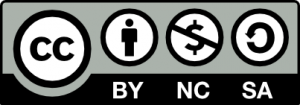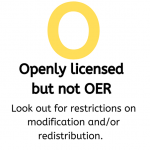| Developed by Benjamin Gillespie, Department of Communication Studies, Baruch College, CUNY |
Weekly Group Meetings & Debrief Report Presentations is an assignment that I created during the pandemic to ensure students had opportunities to interact with their peers while in isolation. I have continued using this assignment in all my classes since then. The premise is simple but effective: I assign small groups of 3 or 4 students in the first week of class. These groups are responsible for meeting outside of class for roughly 30 minutes per week throughout the semester to discuss readings and concepts and to pose questions to one another.
The OER and Course Artifacts
Weekly group meetings & debrief report presentations
During their first group meeting, I instruct students to appoint one person to report back to the class in what I call a “Debrief Report Presentation” after each weekly meeting. This very brief presentation should include a very brief summary (or “report”) of what was discussed within their group meeting. Each student must do this twice throughout the semester. When it is a student’s turn to report back, they must take notes during the group’s meeting that week and then summarize these notes into a short 2-3 minute debrief report presentation given at the beginning of each class.
This means that each class begins by hearing from several student group representatives (1 from each group). If your class meets twice per week, I suggest assigning one day of the week for these report presentations to occur throughout the semester (i.e. if you meet Tuesday/Thursday, always have them due on Thursdays). The presentation component allows students to hear from other students and faculty to hear from students. This helps to get conversations going in the larger class setting and brings up questions or student struggles. With every student in the class doing these short presentations, we get to hear from everyone at least twice. These are low-stakes presentations that do not require a PowerPoint or any other materials. They do not hand anything in. All students do is meet with their group and report back to the class. This is a low-tech, no-cost way to build community.
At weekly meetings, groups can discuss any range of course materials including textbook readings, essays, films, cultural outings, artworks, reports, or anything else. I usually have students discuss an essay alongside another non-text source, such as a documentary video, Ted Talk, artwork, or speech. This assignment can also be tailored for any class format: online, hybrid, or in-person courses. If your class is online and completely asynchronous, these reports could be posted in an online forum for all to read. If synchronous group meetings are not possible, students could communicate through a Google Doc and a summary could be provided by the weekly “presenter.”
This assignment serves to reinforce student-focused learning objectives and facilitate a more interactive education where students learn from one another. It also encourages group collaboration and preparation. It is most successful when students report back on behalf of the entire group rather than just from own perspective. To ensure the groups continue to meet throughout the semester, I have students fill out an anonymous survey early in the semester and then again mid-semester to check in on how the meetings are going. Faculty might also use a Google form or other check-in system to track participation in these meetings, but I have not found this to be necessary. You could also have students create Minutes for each meeting and share them with you, including who was in attendance. The Baruch Teaming website would also be a good resource to consult for this assignment and has additional resources for virtual teaming.
As a combined assignment, the Weekly Group Meetings and Debrief Report Presentations make up roughly 10% of the student’s overall grade. From my experience, this leads to improved communication skills, teamwork, as well as a deeper understanding of core course content. I have included some student testimonials about this assignment as evidence of their value.
focusing on Zero-Cost
When I initially created this team-based assignment, it was during the height of the COVID-19 pandemic. Students were having major issues connecting with other students as well as with understanding the course materials in the new online context. I wanted to create an assignment that wouldn’t require the students to purchase anything new, but that could help to improve their engagement online and with the course materials. It allowed them to use free online platforms to engage in debate and discussion, ultimately improving the online environment. When we returned to in-person, I found it was just as effective to keep using the assignment and still remain at zero cost.
Supplemental materials
1. Assignments Guidelines: Weekly Group Meetings and Debrief Report Presentations
At the beginning of the semester, students are assigned to a small group of 3 or 4 students with whom they will engage throughout the semester outside of class. Students will meet for roughly 30 minutes per week to engage in critical dialogue. In these meetings, students should discuss the readings or other assigned materials in preparation for class, exchanging ideas and questions. At the beginning of the semester, during your first group meeting, students should schedule/sign up for a Debrief Report Presentation for each week throughout the semester. Each student will present twice. Weekly presenters should take detailed notes during their assigned meeting to then summarize and share in a short 2-3 minute Debrief Report Presentation at the beginning of the next class.
I suggest setting up a group chat or email chain to make the scheduling process easier or choosing a regular weekly time to meet. These groupings offer every student the opportunity to do some close analysis of the readings and other materials in an informal atmosphere before class. It will also give students a chance to practice their public speaking skills and advance their understanding of core concepts. While I do not attend these weekly meetings, I will be checking in throughout the semester to see how things are going and providing anonymous surveys to make sure all group members are consistently participating.
2. Student Testimonials
Student 1: The debrief groups are a great way to incorporate many different perspectives found within the readings. Since the groups are small, I feel as if they are easier in the sense to discuss amongst each other compared to the entirety of the class. I do feel like the discussion expands concepts we are discussing in class, and it is an interactive way for all of us as students to equally contribute ideas.
Student 2: The Debrief meetings are helping me delve deeper into the material and learn better by hearing from other perspectives and voices. The discussions help bring up topics that may not have been discussed in class. I think meeting with other students outside of class helps make me feel more connected with the class.
Student 3: I think that the meetings make me not only interact with the material in a way that makes me want to share my thoughts on it with others, but also learn new perspectives on the same reading. They bring a totally new aspect of learning on top of what we learn in class while expanding on topics we learn, which is nice. I think it’s good to meet with students outside of class as it brings the way of thinking and learning outside of the classroom in a more informal, impromptu environment.
Student 4: The discussions allow for a wide variety of perspectives and when we pool our analysis of the readings, and I find that my understanding is a lot better. This helps to expand the concepts as we often bring in our personal experiences which puts things into perspective. I have gotten an insight into so many views which was really appreciated.
Student 5: I feel that the meetings do help me learn better because it is allowing me to hear other people’s opinions over than mine, on topics and also allowing me to get a better understanding of the material. There has been a time where I misinterpreted a reading and getting together to discuss with my group helped clarify a lot for me. They are very helpful in expanding concepts we discuss in class. I am glad that we have the opportunity to talk with our classmates outside of class about the material, it helps us get to know each other more and get more comfortable being in the class in general.
Faculty Information
Benjamin Gillespie (Ph.D.) is a Doctoral Lecturer in Communication Studies at Baruch College. He specializes in professional communication, public speaking, gender studies, theatre and performance studies, and media studies. He earned his Ph.D. in Theatre and Performance from The Graduate Center, CUNY.
Licensing Information
 The Weekly Group Meetings & Debrief Report Presentations assignment is licensed under a Creative Commons Attribution-NonCommercial-ShareAlike 4.0 International License.
The Weekly Group Meetings & Debrief Report Presentations assignment is licensed under a Creative Commons Attribution-NonCommercial-ShareAlike 4.0 International License.
 The Weekly Group Meetings & Debrief Report Presentations assignment created by Benjamin Gillespie is openly licensed but not OER.
The Weekly Group Meetings & Debrief Report Presentations assignment created by Benjamin Gillespie is openly licensed but not OER.

